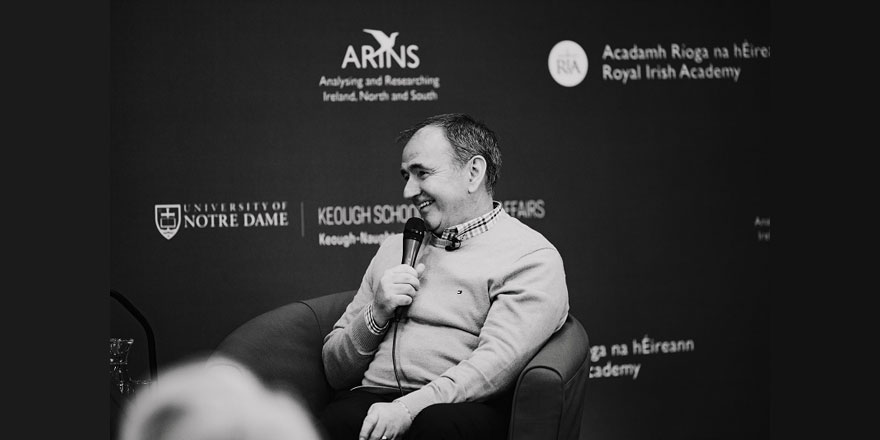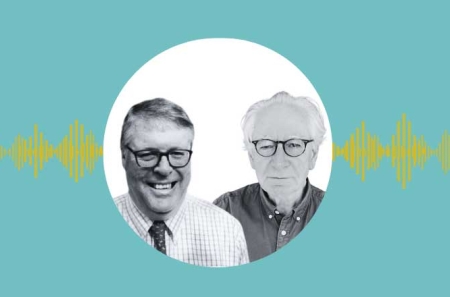
One of their own: A footballer’s journey north
23 April 2024My Identity conversation with Pat Fenlon, by ARINS writers
How does it feel to wear a jersey representing a place, an affiliation and a culture which is foreign to you? One sportsman who is well placed to reflect on the formation of identity is Pat Fenlon, a former midfielder who, during his playing career, made the unique move to cross the border and a sectarian divide to play for Linfield F.C. in Belfast. Fenlon is now Director of Football at Bohemians F.C. in Phibsboro, the oldest League of Ireland football club, founded in 1890.
In a public interview as part of the ARINS My Identity Series in the RIA at lunchtime on Wednesday, 17 April 2024, Fenlon reflected on his experience of playing for Linfield F.C. in Belfast. He told interviewer, Professor Colin Graham of Maynooth University:
‘Sport is a great leveller of people. What I found [moving to Belfast, in 1994] was that all these lads were the same as me. There was no difference between us and there was a common goal – to win football. You had to respect everybody, whether it was their politics or religion.’

Image 1: L-R: Colin Graham, Pat Fenlon
Born in Ballymun in north Dublin in 1969, Fenlon grew up in Finglas South, attending a primary school where soccer ‘wasn’t allowed’ and the hurling was, he laughs, ‘rough’. He moved on to Patrician College in Finglas, whose former pupils included the legendary player Ronnie Whelan, and where he was able to pay more attention to his football than his academic studies. At seventeen, after the Inter Cert, Fenlon went to London to play a trial game for Chelsea. ‘The game didn’t go very well,’ he recalled. ‘We were beaten 10–1 by Tottenham, but I scored the only goal.’ Fenlon talked about the excitement and the anxiety of being a young Irish man alone in London in the 1980s; being homesick and occasionally treated with suspicion and yet loving the city and playing football.
Returning from London, Fenlon joined what he fondly remembers as a ‘group of rejects’ at St Patrick’s Athletic under the management of Brian Kerr. An immensely successful League of Ireland career with St Pat’s, where he won the League, and Bohemians, where he was a cup winner and PFAI Player of the Year, came to an end when a new manager arrived at Bohs and Fenlon went in search of a new challenge. The approach from Linfield came, as Fenlon quipped, ‘out of the blue’, taking League of Ireland football by surprise. He had been ‘a little bit disillusioned’ towards the end of 1993 before he made this ‘high-profile and peculiar move’. Footballers from south of the border were playing for other Irish League teams in the North, but Linfield were the biggest club in the League and their reputation and history as a club representing Loyalism meant that Fenlon’s move was particularly controversial.
Asked how he handled the transition, Fenlon described a mixed reaction in his native Dublin:
‘I got more stick in Dublin for playing for Linfield than I did in Belfast. I was unique in that I got often called both a ‘Loyalist b****** and a ‘Fenian b******* on the same day.’
Sport is ‘a social glue and/or social toxin’, write ARINS contributors Katie Liston and Joseph Maguire in their insightful essay on sport here. For Fenlon, football is a leveller of identity, both for fans and for supporters.
‘Football fans just want their team to be successful. They don’t care who you are or what you are, what your background or religion or your identity is.’ ‘If you’re successful you become one of their own,’ added Graham.
Fenlon recalled that his early weeks with Linfield were blighted by injury and when he did first get playing time he was slow to integrate into the team. But a few matches in, having started the game he was substituted. Linfield booed him coming off, but the realisation that they were booing because they wanted him kept on the field was the moment he knew they had accepted him. Though they did, comically, change his name. ‘They didn’t want to call me Pat, Paddy or Patrick,’ he laughs. So they called him Billy. To this day, Fenlon says, when he returns to Linfield, he is universally referred to as Billy Fenlon. And in the changing room, he says, apart from some banter, ‘my experience is that identity is not something we discuss as players or managers. I wanted to play football, I wanted to be successful, and Linfield gave me the best chance to do this.’

Image 2: L-R: Colin Graham, Pat Fenlon
A 24-year old Fenlon had moved north in early 1994, just ahead of the IRA ceasefire. Linfield were a part-time team at the time and trained twice a week, in the evenings, and played on Saturdays. Fenlon’s cross-border experience was very much resonant of the time. Living in Dublin, but playing in Belfast, his journeys were interrupted by bomb scares on the train line, and on Saturdays he travelled with a group of other players from Dublin who had signed to Irish League teams. The Linfield kitman was assigned to collect Fenlon from Newry and drive him to and from the train station, to be sure he arrived safely at practice and matches. It was a ‘sheltered’ time, he recalled: ‘They looked after me tremendously well.’
When his playing career was finished Fenlon had an extremely successful managerial career, winning trophies and taking Shelbourne further in the Champions League than any other League of Ireland team has gone before or since. A spell as manager of Hibernian in Edinburgh showed him football at an even more elevated level, in a city where it is the foremost sport and the team’s performance is under constant media scrutiny. Being Irish was neither a help or hindrance to management of a club traditionally associated with the city’s Irish population, Fenlon noting that the rivalry between ‘Hearts and Hibs’ is probably less based on sectarian grounds than it is with the big two Glasgow clubs. ‘Hibs fans hate Rangers and Celtic’, he wryly told us.
In recent years Fenlon has developed the Director of Football role both within the Irish League and the League of Ireland. Going back to Linfield in 2018 as General Manager was much less controversial than his 1994 move. ‘Nobody batted an eyelid. The times had changed.’ This managerial role gave him a new perspective on football as a business, and here Linfield’s heritage, and its structure, present an interesting problem. Linfield is owned by its members. Other clubs in the Irish League are not fan-owned and they can benefit from injections of investment cash from individuals who buy all or part of the club. Linfield’s structure does not allow for this and so other income streams are needed. But Fenlon noted that it is occasionally difficult to persuade sponsors to come on board with Linfield, given their political associations. This is in contrast to his current club, Bohemians F.C. Bohs is also fan-owned and its current success has involved creating a strong community base. While Bohs was recently referred to in the Irish Times as a ‘hipsters’ paradise’ in a profile of Fenlon, he is proud that Bohs home games are now regularly sold out.
Irish football had been partitioned since the 1920s, but Fenlon’s cross-border experience in football, allied with his responsibility for the financial health of clubs in both leagues, means that he is very open to the development of new football competitions involving teams from across the island. He noted that the women’s game in Ireland currently has such a competition. Fenlon’s experience is that those who love football – players and fans – have a passion for the sport which will allow them traverse traditional boundaries of political identity.

Image 3: L-R: Colin Graham, Pat Fenlon
The ‘My Identity’ conversation series is an initiative of the ARINS project. This series seeks to understand the diverse identities and traditions on the island of Ireland and how they are understood, felt, expressed and promoted. The next event is taking place on Monday, 29 April. Find out more
The ARINS project is a joint project of the Keough Naughton Institute for Irish Studies at the University of Notre Dame and the Royal Irish Academy.



